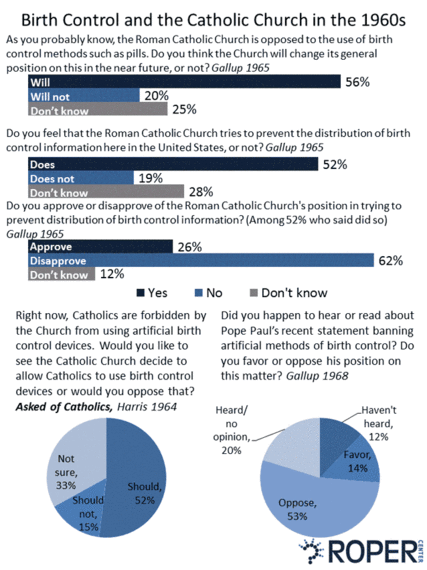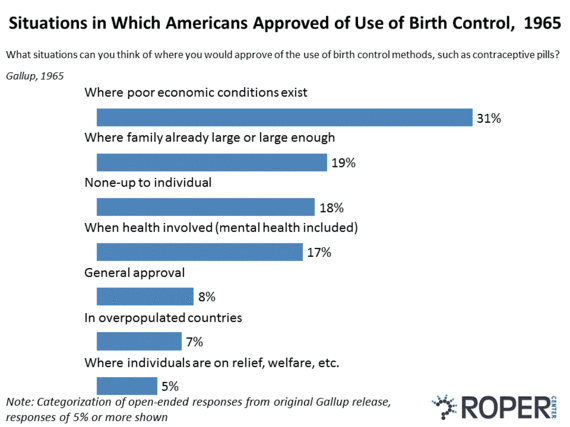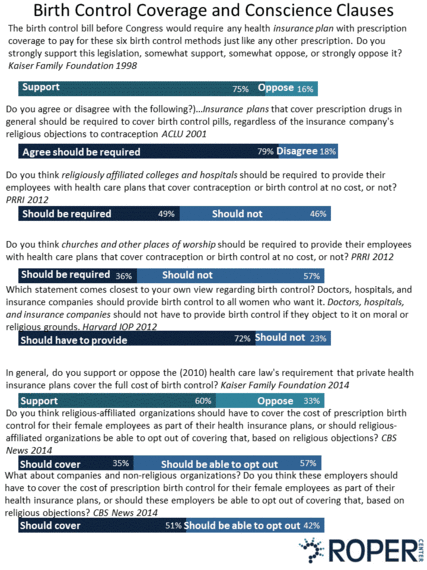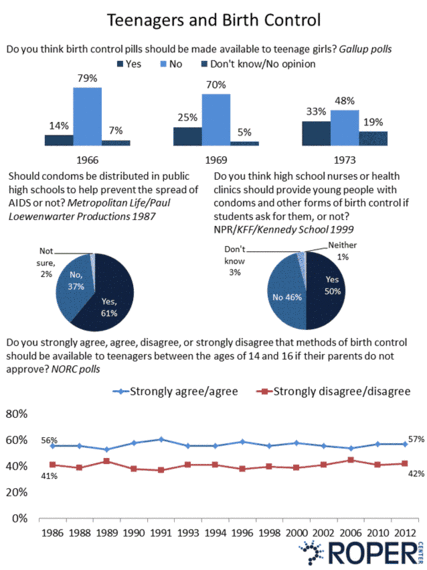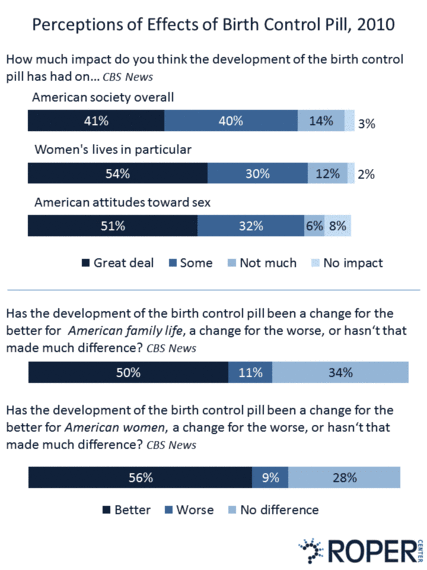Fifty years ago, just five years after the FDA approved the first birth control pill, the Supreme Court struck down a Connecticut state law that prohibited the use of "any drug, medicinal article, or instrument for the purpose of preventing conception," thereby making birth control legal nationwide for married couples. Public opinion was on the Court's side in Griswold v. Connecticut, but public controversies over contraceptives have continued to this day. A history of public opinion about birth control, from the Roper Center for Public Opinion Research Archive:
From popular movement to legality
The first public opinion question about birth control was asked by Gallup in 1937. Sixty-one percent of Americans in this poll said they supported the birth control movement, while 26% said no, and 13% gave no answer.
In the 1930s and 1940s, Gallup asked whether people supported government health clinics providing birth control information to married people who want it. The first time this question was asked, in 1939, 71% were in favor and only 18% disagreed. Strong majorities continued to support this proposal, and, in later questions, the idea that birth control information should be available to anyone who wants it. By the time of the Griswold decision in 1965, 81% believed that it should be legal to supply birth control information.
Griswold protected access to birth control under a "right to marital privacy," but the right to possess contraception was not extended to unmarried couples until the Supreme Court's decision in Eisenstadt v. Baird in 1972. There is little indication, however, that the public saw a distinction between married and unmarried people in terms of rights to birth control information. Questions from this period which asked about furnishing birth control information to married couples, those which asked if birth control information should be available to anyone who wants it, and those that simply asked if the distribution of birth control information should be legal all received similar levels of support.
Birth control and the Catholic Church
There was, of course, one group of Americans who might have been expected to hold different views about birth control: Catholics. The Catholic Church was and remains opposed to the use of birth control and was a vocal defender of prohibitions on contraceptives. In 1964, just over half of Catholics said that the church should change its position, while 15% disagreed and a third were unsure. Many Americans at the time believed that the Church was ready to do just that. Among those who knew in 1965 that the Catholic Church opposed birth control (66%), 54% thought the Church would change its position within five years and 27% within ten. This widespread perception was likely due to the Pope John XXII's creation of the Pontifical Commission on Birth Control to review the Church's teachings in light of new developments in birth control methods; i.e. the pill. Although the committee's official report recommended the birth control ban be lifted, in 1968 Pope Paul instead issued Humanae vitae: On the Regulation of Birth, reaffirming the Church's traditional teaching against artificial birth control. Fifty-three percent of the country opposed his position; only 14% favored it.
Birth control and the poor
Although Americans in the sixties were supportive of making contraceptive information available to all, there was some indication that many saw the primary value of birth control as relieving the burden of poor families. When asked to say in their own words when they would approve of the use of birth control, only 18% said it was up to the individual and 8% expressed general approval. A plurality of 31% approved when poor economic conditions exist.
In a 1969 Gallup poll, 69% of Americans thought birth control should be made available free to all women on relief of child-bearing age, and in 1977, 63% of the country in a NYT/CBS News poll said that the government should help poor women with the cost of contraceptives. The next time this idea was broached, the focus had turned from assistance to coercion. In a 1997 Time/CNN/Yankelovich poll, 43% of Americans favored requiring welfare mothers to accept contraceptive implants, 50% opposed. Since then, the idea of encouraging birth control among the poor has not been a topic of polling. However, the question of who pays for contraceptives - and who shouldn't have to - has become increasingly controversial.
Insurance and conscience clauses
In April 1998, Maryland became the first state to mandate that insurance companies cover birth control, and shortly after a national bill was introduced that required any health insurance plan with prescription coverage to pay for six birth control methods just like any other prescription. A Kaiser Family Foundation poll found 75% of the country approved of this bill, while 16% were opposed. The bill did not pass, but many states followed Maryland in enacting their own laws.
Increasing requirements led to increasing debate over what exceptions could be provided for those companies and medical professionals who were opposed to birth control on moral grounds. The controversy intensified with the passing of the ACA and its mandate that birth control be covered by all health insurance plans, a requirement that was challenged on grounds of religious freedom. Polling has found that the public in general supports the requirement that insurance companies cover birth control, but their support for conscience clauses varies considerably based on question wording and the organizations or individuals requesting exemption. In a Kaiser Family Foundation poll, the country was split on the Supreme Court's decision that privately-held for-profit companies may choose not to pay for coverage of prescription birth control in their workers' health plans if the company's owner has religious objections, with 47% approving and 49% disapproving.
Teenagers and birth control
Access to birth control information and actual contraceptives for teenagers has long been contentious. At the time of the Griswold decision, 46% in a Gallup poll supported sex education courses which included birth control information. Providing contraceptive access was even less popular. In a 1966 Gallup poll, just 14% of the country thought birth control pill should be available to teenage girls. This number rose somewhat into the early 1970s, but not until the AIDS epidemic did a poll find a majority of Americans supporting contraceptive access for teenagers. Public attitudes about providing birth control to young teenagers (14-16) without parental approval have stayed remarkably stable since the early years of AIDS.
Legacy of Griswold and the pill: Widespread use and social change
In a 2010 CBS poll, Americans were asked about the impact of the development of the birth control pill. Half the country saw the development of the pill as having changed American family life for the better, while only 11% said it had changed it for the worse.
Furthermore, any dispute over the morality of birth control appears to have been firmly resolved. When Gallup asked in 2015 if birth control in general was morally acceptable, 89% of the country said it was. The question was far from theoretical for many respondents. In 2010, nearly a half-century since revolutionary legal and medical changes had ensured access to reliable birth control, 75% of American women in a CBS poll said they had used birth control pills.


